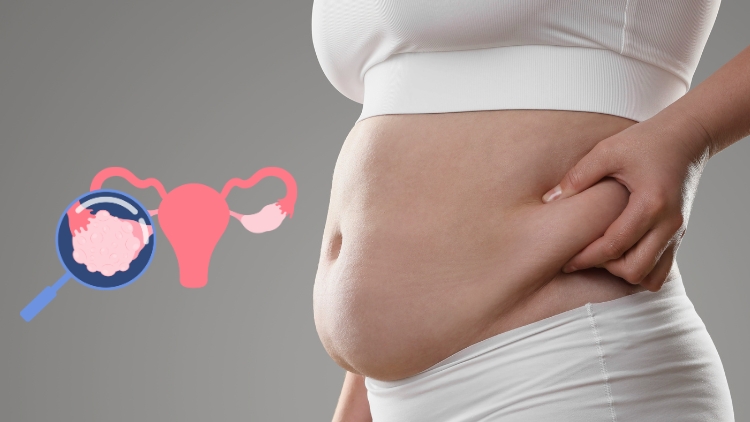My PCOS diagnosis felt like a punch to the gut. Suddenly, so many things made sense: the irregular periods, the frustrating acne, and the constant struggle to lose weight. It felt like my body was working against me. I tried every diet under the sun – keto, low-carb, you name it – but nothing seemed to stick. I’d lose a few pounds, then gain it all back (and then some!). It was exhausting and demoralizing.
I remember one particularly frustrating day, scrolling through endless online forums filled with conflicting advice. I felt completely overwhelmed. That’s when I stumbled upon a blog post by a woman with PCOS who had successfully managed her weight. Her story resonated with me because it wasn’t about a quick fix; it was about understanding her body and making sustainable changes. That was my turning point. I decided to ditch the fad diets and focus on a holistic approach, inspired by her story and my own research.
Here’s what I learned – and what actually helped me on my PCOS weight-loss journey:
1. The Gut Revelation: My Accidental Probiotic Discovery
Honestly, I used to roll my eyes at the whole “gut health” craze. But then, while traveling in Eastern Europe, I started eating a lot of naturally fermented foods – real sauerkraut, kefir, and homemade yogurt – simply because they were local staples. I noticed a surprising change: my digestion improved, my energy levels were up, and, most importantly, my usual cravings started to subside.
When I got home, I did some digging and discovered the link between gut health and PCOS. It turns out, many women with PCOS have an imbalance of gut bacteria. Those fermented foods I’d been enjoying were packed with probiotics, the “good” bacteria that help restore balance. Now, I make a conscious effort to include them in my diet. My go-to is a simple breakfast of plain Greek yogurt with berries and a sprinkle of chia seeds.

2. The Carbohydrate Conundrum: Learning to Love (the Right) Carbs
Like many people, I initially thought the solution to PCOS weight gain was to drastically cut carbs. I tried it, and it was miserable. I was constantly tired and cranky, and the cravings were unbearable. Then, I read a book by a registered dietitian specializing in PCOS, and it completely changed my perspective.
She explained the difference between simple and complex carbohydrates. Simple carbs (white bread, sugary treats) are the enemy – they cause blood sugar spikes and worsen insulin resistance. Complex carbs (whole grains, vegetables, legumes) are your friends. They provide sustained energy and help regulate blood sugar. Now, I focus on swapping out the simple carbs for complex ones. Brown rice instead of white, whole-wheat pasta instead of regular, and lots of veggies.

3. Protein Power: My Secret Weapon Against Cravings
I used to think protein was just for bodybuilders. Boy, was I wrong! A friend who is a personal trainer (and also has PCOS) emphasized the importance of protein for managing blood sugar and staying full. She explained that protein takes longer to digest, which helps prevent those energy crashes and cravings that often lead to unhealthy choices.
She was right. When I started including a good source of protein with every meal and snack, I noticed a huge difference. I felt fuller for longer, and those afternoon sugar cravings became much less intense. My favorite protein sources are grilled chicken, fish, eggs, lentils, and Greek yogurt.

4. Embracing Healthy Fats: No More Fat Phobia!
For years, I was terrified of fat. I thought it was the enemy of weight loss. But through my research (and a lot of conversations with my doctor), I learned that healthy fats are actually essential for hormone balance and overall health. They also help you feel satisfied after meals, which is crucial for preventing overeating.
Now, I make sure to include healthy fats like avocados, olive oil, nuts, and seeds in my diet. I drizzle olive oil on my salads, snack on a handful of almonds, and enjoy avocado toast (on whole-grain bread, of course!). It’s made a surprising difference in how satisfied I feel.

5. Finding My Fitness Groove: From Gym Dread to Joyful Movement (and a Helpful Video!)
I’ve always hated the gym. The idea of spending hours on a treadmill, surrounded by sweaty strangers and blaring music, filled me with dread. I knew exercise was important for managing PCOS, but forcing myself to do something I loathed felt like a recipe for failure. So, I started exploring. I tried a few group fitness classes – Zumba, spin – but nothing clicked. It all felt too intense, too… much. Then I took a beginner’s yoga class, and something shifted. The focus on breath, on connecting with my body, felt calming and empowering, not punishing.
But I also knew I needed more than just yoga. I wanted something that would get my heart rate up and build strength, but without the high-impact jarring that often left me feeling achy and inflamed. That’s when I stumbled upon this amazing online workout video. It was specifically designed for women with hormonal imbalances, PCOS, or irregular periods – like it was made for me!
What I love about this 30-minute workout is that it’s a perfect blend of strength and cardio, but it’s all low-impact and beginner-friendly. No jumping around or crazy burpees! It focuses on improving circulation and blood flow, which the creator says can help with weight loss and reducing belly fat (a common PCOS struggle).
The routine starts with a warm-up, then moves into three circuits. Each circuit has four exercises, and you do each exercise for one minute. It’s all about strengthening and toning different muscle groups, and it feels good. The instructor is encouraging and provides modifications, so it’s easy to adjust the intensity to your own fitness level.
The video’s creator recommends combining this workout with her PCOS yoga videos for the best results in terms of weight loss and hormonal balance. I’ve started doing that – a few days of this strength/cardio workout and a few days of yoga – and it’s been a game-changer. It’s not about punishing myself with exercise anymore; it’s about finding joyful movement that makes me feel strong and energized. I even added long walks with my dog. It made a big difference.
6. The Sleep Solution: Finally Prioritizing Rest
I used to be a chronic night owl, staying up late and then dragging myself out of bed in the morning. I never realized how much this was affecting my PCOS. After reading about the link between sleep and hormone balance, I made a conscious effort to prioritize sleep.
I started going to bed and waking up at the same time each day, even on weekends. I created a relaxing bedtime routine (no screens before bed!), and I made sure my bedroom was dark, quiet, and cool. It took some time to adjust, but the difference in my energy levels and cravings was remarkable.
7. Stress-Busting Strategies: My Ongoing Battle (and Small Victories)
Stress is a constant battle, and I’m definitely still working on this one. It’s like a sneaky gremlin that messes with my hormones and makes everything, including weight management, so much harder. I’ve learned that when I’m stressed, my cortisol levels spike, which can worsen insulin resistance and lead to weight gain – a vicious cycle I’m determined to break.
I’ve found that a few things really help me unwind and keep that stress gremlin at bay. Spending time in nature is a big one – even a short walk in a park can make a difference. I also try to practice mindfulness, even if it’s just a few minutes of deep breathing exercises each day. And, of course, making time for activities I enjoy, like reading and spending time with friends, is crucial for my overall well-being.
But my newest (and perhaps favorite) stress-busting weapon is a warm milk and turmeric ritual before bed. I learned about the anti-inflammatory properties of turmeric (curcumin, specifically) and its potential benefits for PCOS, so I started experimenting. Now, I warm up a cup of milk (I use unsweetened almond milk), add a teaspoon of turmeric powder, a pinch of black pepper (which helps with absorption), and sometimes a tiny bit of honey or cinnamon for flavor. It’s incredibly soothing, and I find that it helps me relax and fall asleep more easily. Plus, knowing that I’m doing something good for my body adds to the calming effect. It’s become a little nightly ritual that I really look forward to. It has really helped with sleeping better, and also lowering inflammation.
My PCOS Journey: It’s a Marathon, Not a Sprint
My weight-loss journey with PCOS hasn’t been a straight line. There have been ups and downs, setbacks and successes. But by learning about my body, listening to its cues, and making sustainable lifestyle changes, I’ve finally found a way to manage my weight and feel healthier and more energized. It’s an ongoing process, but I’m committed to it. And if I can do it, you can too.
Important Note: My experience is just that – my experience. I’m not a doctor or a registered dietitian. This information is not intended to replace professional medical advice. Always consult with your healthcare provider before making any significant changes to your diet or exercise routine, especially if you have1 PCOS or any other health condition.
References
- Effect of Dietary Composition on Weight Loss and Body Composition in Women With Polycystic Ovary Syndrome: A Systematic Review and Meta-Analysis
- Exercise for overweight or obese women with polycystic ovary syndrome: a systematic review and meta-analysis
- The Potential Role of Probiotics in the Management of Polycystic Ovary Syndrome: A Review
- Sleep and Polycystic Ovary Syndrome
- Stress and Polycystic Ovary Syndrome: A Systematic Review
- Effects of Aerobic Exercise on Markers of Insulin Sensitivity and Cardiovascular Risk Factors in Overweight and Obese Women With and Without Polycystic Ovary Syndrome
- The Association between Stress, Cortisol, and Adiposity in Children and Adolescents: A Systematic Review and Meta-Analysis
- High-protein, low-glycemic index diet for the treatment of polycystic ovary syndrome: a randomized controlled trial
- Dietary Fiber Intake and Insulin Resistance in Women with and without Polycystic Ovary Syndrome







